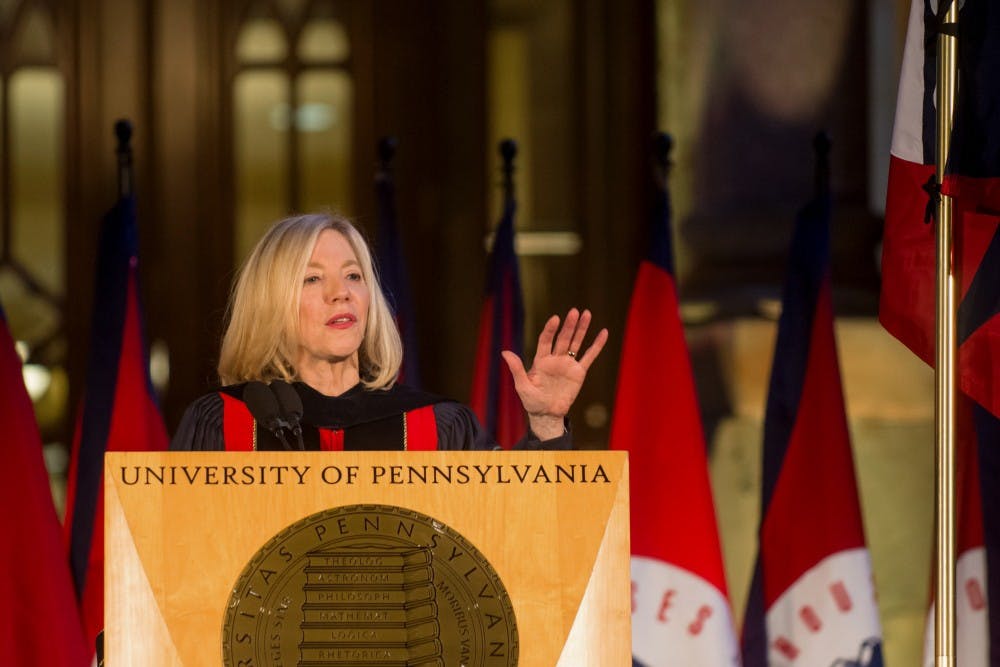
In an interview with three Daily Pennsylvanian editors, Penn President Amy Gutmann discussed economic diversity and the effect of President Trump's policies on undocumented students
Credit: Daniel XuPenn President Amy Gutmann called Penn a "safe space for students, faculty and staff" and defended the economic diversity of its student body in a sit-down interview Thursday with three Daily Pennsylvanian editors.
Gutmann spoke with the editors in her College Hall office for about 15 minutes off the record before answering questions for around 30 minutes. Throughout the interview, she spoke about the treatment of undocumented students and maintained University efforts to increase economic diversity, but refrained from entering any politically divisive territory. Five times throughout the brief interview, Gutmann declined to answer questions on the record, offering instead an off-the-record explanation of her views.
When asked how Penn would respond to President Donald Trump rolling back the Deferred Action for Childhood Arrivals program, which former President Barack Obama established in an executive order, she reiterated the stance taken by the University in November, which called Penn a "sanctuary" for undocumented students.
“We, as I said in my email, have long been a safe space for students, faculty and staff," Gutmann said. "And I will continue, and we will continue to advocate for DACA, for extension of DACA, for the BRIDGE [Act] and continue to do that."
But Gutmann stopped short of using the politically charged term “sanctuary campus” itself. When asked if she would describe Penn in that way specifically, she asked to go off the record. When asked later if any of the legislation currently brewing in state and national legislatures in an attempt to defund "sanctuary campuses" could affect Penn, she again asked to go off the record.
In response to a recent New York Times report showing a general lack of economic diversity at Penn and its peer schools, she said the data was "six or seven years old" and noted the existing initiatives to recruit lower-income students.
“We’ve gone from 2006, having one out of twenty of our students coming from first generation, to now having one out of eight of our students be first generation,” she said. “We’ve gone from having 10 percent Pell Grant students to 14 percent Pell Grant students from 2006 to now. There’s a 40 percent increase.”
“We do provide a kind of upward mobility,” she added, pointing out that the study showed that lower-income students go on to earn about as much as affluent students at the same college.
Gutmann's description of Penn's efforts to increase economics diversity comes a week after the University Board of Trustees announced a 3.9 percent increase in tuition.
Members of the Undergraduate Assembly met with administrators and a trustee to advocate against the hike, pointing to statistics that project the cost of Penn to be $100,000 a year in 11 years.
“We’ve done our very best to keep the rate of increase as low as possible,” Gutmann said. “As tuition goes up, financial aid goes up even more.”
Financial aid supports middle-class students in addition to low-income students, she said, noting that roughly half of the students on financial aid are from families earning more than $100,000 a year.
Gutmann also commented on the task force launched two months after campus protests erupted over a sexist party invitation sent by off-campus organization OZ. Part of its stated purview is to look into the “negative influence of unaffiliated and unsupervised groups.”
Despite the focus on off-campus organizations, Gutmann said the task force will "absolutely not" ignore sexist behavior committed by on-campus groups.
“The task force is charged with looking at what the University can do to make sure that we’re doing everything that we can do to make the climate the best for minimizing sexual assault and harassment and for being the most conducive to healthy, respectful student life,” she said.
The Daily Pennsylvanian is an independent, student-run newspaper. Please consider making a donation to support the coverage that shapes the University. Your generosity ensures a future of strong journalism at Penn.
Donate







